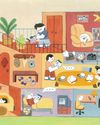
Dovi Henry, a poet and University of Toronto French major, had been missing for more than two months when his body washed up at an Ontario Place marina in July 2014. Naked except for a pair of threadbare socks, the corpse had de composed to the point that race and sex were not immediately apparent. The coroner’s office was unable to determine the cause of death.
For roughly the next two years, the un identified remains lay in repose at a Toronto morgue while Dovi’s mother, Maureen Henry, did all the things one does when their child goes missing: notified the police, contacted his friends, combed the streets, grieved. There were small leads — one friend thought Dovi might have gone to Germany — but nothing panned out.
In April 2016, Henry googled “un claimed black male remains.” The search turned up the website of the Ontario Provincial Police (OPP) Missing Persons and Unidentified Bodies Unit — and a list ing that seemed like a possible match. She called the oPP, and after examining Dovi’s dental records, a forensic dentist confirmed it.
This story is from the May 2020 edition of The Walrus.
Start your 7-day Magzter GOLD free trial to access thousands of curated premium stories, and 8,500+ magazines and newspapers.
Already a subscriber ? Sign In
This story is from the May 2020 edition of The Walrus.
Start your 7-day Magzter GOLD free trial to access thousands of curated premium stories, and 8,500+ magazines and newspapers.
Already a subscriber? Sign In

Invisible Lives
Without immigration status, Canada's undocumented youth stay in the shadows

My Guilty Pleasure
"The late nights are mine alone, and I'll spend them however I damn well please"

Vaclav Smil Is Fed Up
The acclaimed environmental scientist is criticizing climate activists, shunning media, and stepping back just when we need him most

It's Time for a Birth Control Revolution
What the pill teaches us about the failure - and future - of women's health care

Would You Watch a Play about Hydro Electricity?
How documentary theatre struck a chord in Quebec

Still Spinning
One record chain has bet big on a new appetite for physical media

Just So You Know, I Love My Mother
In many ways, multi-generational living makes sense. But that doesn't make it easy

Art of the Steal
Why are plundered African artifacts still in Western museums?

Canada in the Middle
What role can we play in easing the war in Gaza?
Canadian Multiculturalism: A Work in Progress
As we mark fifty years since the adoption of Canada’s federal multiculturalism policy, human rights advocate AMIRA ELGHAWABY celebrates its merits and reflects on the work that is yet to be done when it comes to inclusion, acceptance, and fighting systemic racism in our country.